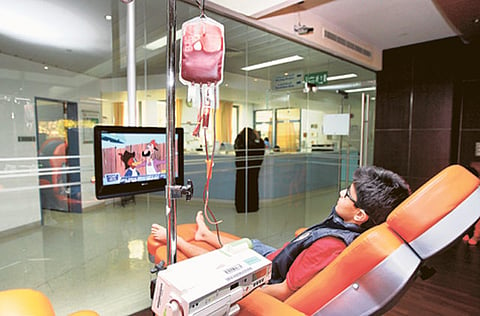Blood donation: Positive about giving life
Mohammad's visit helps to highlight how each individual can make a difference by donating blood

Dubai: "It was a turning point in the history of the centre," said Dr Essam Dohair, outreach co-ordinator for the Thalassaemia Centre at Dubai's Latifa Hospital, of the visit made by His Highness Shaikh Mohammad Bin Rashid Al Maktoum, Vice-President and Prime Minister of the UAE and Ruler of Dubai, on Wednesday.
The same day, more than 200 people came to the hospital to donate blood, Dr Dohair told Gulf News. "The next day we had more than 500 donors and the day after, more than 700. On a regular day, we have 50-60 donors," he said.
The patients at the Thalassaemia Centre were extremely happy, said Dr Dohair who has been with the centre for the past 23 years. "The visit was a surprise. His Highness first visited the Thalassaemia Centre to talk to the patients, and then visited the blood donation centre. The patients later expressed how valued they felt because their leader has donated blood for his people."
Madiha Ameen, a Pakistani national, has been visiting the Thalassaemia Centre for the past 26 years to receive 3-4 units of blood every three weeks. She told Gulf News, "My appointment was on the next day of our Ruler's visit. I saw donors from official organisations like the navy, police and the army. I was thrilled. If a leader of an emirate can take time out from his schedule to donate, everyone can."
Vital need
Speaking of the need for regular blood donations, Ameen said, "We appreciate all the donors, and hope that they will continue to donate throughout the year — not just a few weeks. Every day, thalassaemia patients need blood transfusions. On every visit, I meet more than 25 patients, including patients who have travelled from Oman."
Like Ameen, other patients too were touched by Shaikh Mohammad's initiative, some of them particularly relieved that they would not be asked to reschedule their visits due to a shortfall of blood units.
Ali, 27, from India, shared his experience with Gulf News. "I have been getting regular — 4 units, every four weeks — transfusion for 15 years at the hospital. In the past six months however I have been asked to reschedule my appointment due to insufficient blood units. Instead of four units, I was given only two or three. It was a scary scenario because we cannot function without regular blood transfusion and, as a working professional, I cannot keep taking time off to visit the hospital more than once or twice a month," he said.
Sohaib Azam, 29, from Pakistan, said he was aware of the shortfall, but wasn't affected as badly. He told Gulf News: "There were enough units for my blood group. Many patients I know though were affected due to lesser units in their blood group. A few others who didn't require urgent transfusion were asked to reschedule their appointments. As an active voice for various associations like the Emirates Thalassaemia Society and UAE Genetic Diseases Association, I decided to take the initiative and began to spread the word through my social networks. When I heard the news about the Ruler's visit, I thought to myself, ‘No one could have done more than that'."
When asked whether limited blood units and/or rescheduled appointments would impact thalassaemia patients adversely, Dr Dohair told Gulf News that patients who needed urgent transfusion were given priority. "We assess the level of haemoglobin, ensuring that it is enough for normal functioning. Patients whose haemoglobin count was lower than required, were given the minimum they require. As of Monday morning, every patient has been given the optimum requirement."
- 8.33%: is the estimated percentage of the total UAE population carrying the gene for thalassaemia
- 50-60: people donate blood for thalassaemia patients on average each day at Latifa Hospital
- 70m: people or more worldwide are afflicted with beta-thalassaemia minor, as per 2010 estimates


